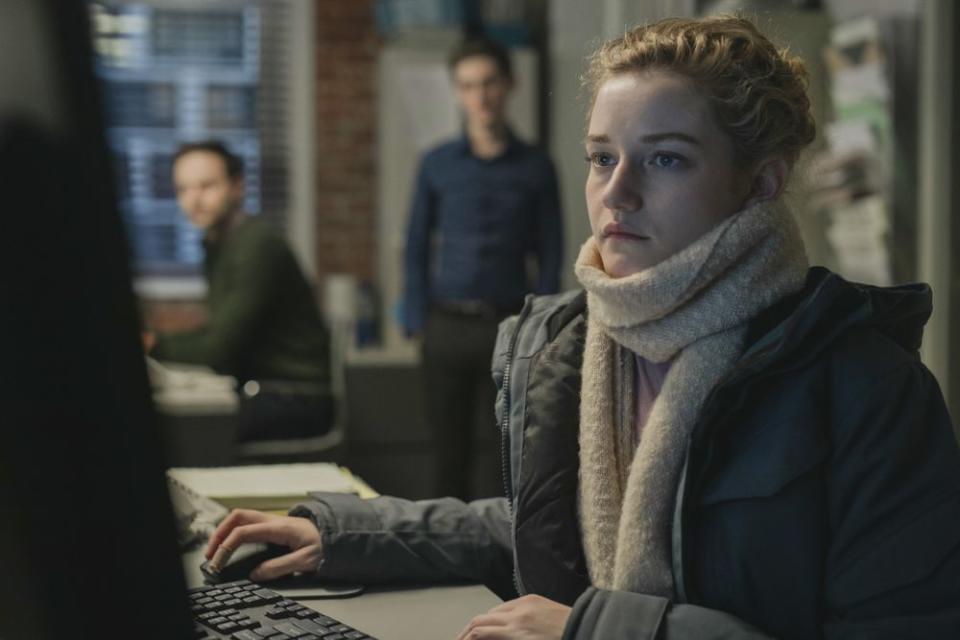Sundance directors on programming a festival in Trump's America — and #MeToo Hollywood
The 2020 Sundance Film Festival lineup dropped Wednesday afternoon, providing cinephiles with 118 exciting new titles to look forward to. With the release of the list, EW caught up with festival director John Cooper and programming director Kim Yutani for insight into the curation of this year’s program, selected from a record-high 15,100 submissions.
“I would say the word that comes to mind is ‘distinctive,’” Yutani says in regard to the 2020 lineup as a whole. “We are diverse by design, I would say. We have a team of programmers coming from different backgrounds, different outlooks on life. Everybody responds to something different, and I think that kind of curation creates a program that can be completely defined as distinct.” That goes for form as well as story: “More and more, I think, in the independent film world, [artists] are telling films in the most inventive way possible that actually matches the story,” Cooper adds. “That makes them distinctive too.”
Singular though each film may be, trends always emerge, and this year topics of race in America and the American experience for immigrants and people of color popped up repeatedly in the lineup. “It made itself known organically that that’s what is on the mind of the artists,” Cooper says. And while race has always been a fruitful topic for the subversive indie fest, the current political climate has added new layers to it. “Immigration is sort of a new part of that story that has kind of infiltrated [those films],” Cooper says, citing “the notion of borders,” both real and imagined, as a contemporary fixation they’ve identified among artists.
Three years into Trump’s America, the filmmaking community has had time to sit with our new political reality, and the president casts a large shadow over the Sundance slate. Yutani cites documentaries The Fight, about ACLU lawyers combating the administration’s policies, and Us Kids, which follows the teenage survivors of the 2018 Parkland school shooting as they launch a nationwide movement to reclaim our democracy, as direct reactions to the current government. In a more abstract response to Trump, Cooper mentions films like Boys State (pictured), in which a group of teenage boys build their own government from the ground up. “You look at America different after watching that film,” he says.

“It is Sundance terrain, for sure, over the years,” Cooper says, for festival selections to engage with politics and potentially act as vehicles for change. But this year, with an election looming, has that intensified? Maybe so, the directors agree. “Maybe there’s more of an urgency around these stories,” Cooper continues. That urgency makes people more willing to fund the kinds of projects that challenge the government or comment on the administration, but it also narrows the field of subjects that filmmakers are illuminating. “You would think there would be many more films, still, on climate change,” Cooper offers as an example. “We see some and we show some, but there’s not as many as you would think for how big that problem really is. Maybe because people don’t know how to tell the story or how to get into it in a way that seems impactful. But I think that there’s an audience for these [political] films now that’s maybe a little more heightened.”
“I feel like our filmmakers are truly reflecting the world that we live in,” Yutani adds. “In this moment especially, I feel like there are issues on their minds, and it’s coming out in their work, and we are more than happy to include them in the program. Because I feel like, as a whole too, what we do at Sundance is to represent our times.”
Our times are also characterized by a disturbing chapter in Hollywood itself, with the #MeToo movement casting a sobering light on the widespread sexual harassment and assault that have gone on for decades, unchecked, in the film industry — including at Sundance, where Harvey Weinstein was a major power player (and where some of his alleged misconduct took place) throughout the ’90s.
The directors recognize that some alleged #MeToo perpetrators were a part of the indie community; Cooper recalls showing Louis C.K.’s early shorts and first feature, as well as Morgan Spurlock’s first feature, long before either of their names had been linked to misconduct. Not long ago — and not long before the first Weinstein exposé kicked off the seismic shift in the industry that #MeToo has brought on — Nate Parker’s Birth of a Nation premiered at the 2016 fest to early awards buzz, only for his Oscar hopes to be dashed that summer, ahead of the film’s theatrical release, with the resurfacing of a rape allegation against him from years prior. It was a strange case that “actually doesn’t look like such a weird story anymore,” Cooper observes. Parker’s latest film, American Skin, premiered at Venice this year, which Cooper noticed at the time and admits to having been “curious” as to why Parker didn’t first try to screen it at Sundance, where he’d had such success (however short-lived) years before.
Had he submitted it there first, however, whether Sundance would have programmed the film is another thorny question. Cooper and Yutani agree that it would have to be a case-by-case consideration whether to accept films involving artists who have been accused of some kind of misconduct. “That’s how we evaluate every film throughout the process,” Yutani says. “I think it would be wrong for us to have some kind of policy around this. It really is project by project.” Conveniently, they haven’t had to deal with much controversial context surrounding actors and filmmakers, since “there’s a natural selection here,” Cooper points out. “They don’t have a lot of new projects.”

The program addresses #MeToo not as much with the identities of its players, but the content of its films. This year’s lineup includes entries like Kitty Green’s The Assistant (pictured) and a still-untitled music industry doc from Kirby Dick and Amy Ziering; last year brought Dan Reed’s buzzy Michael Jackson documentary Leaving Neverland. “That was controversial for a lot of people, but it was a film that was good and right to show,” Cooper says. “If it was messy and not complete, I probably wouldn’t have shown it. [That’s] more important the harder the topic is, and you just have to make sure that they’re doing it right to actually create the impact that is effective.”
Next year’s program of impactful indies kicks off Jan. 23. Keep checking back at EW for more about the upcoming fest.
Related stories:
